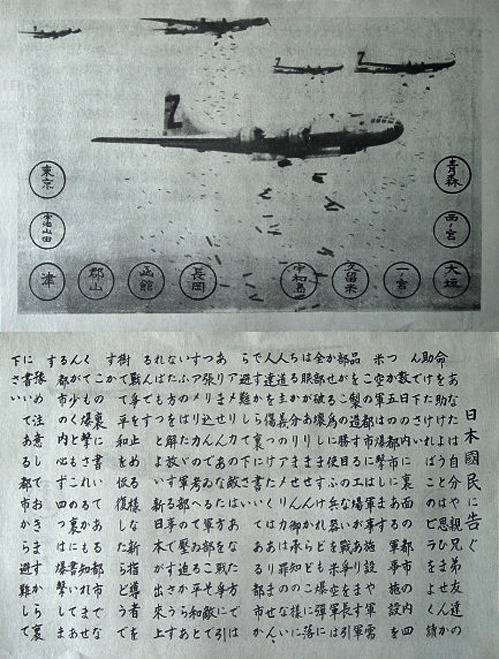And you were already informed that it was an accepted Ally practice that you would bomb in order to cause surrender. That was true of the US and Great Britain especially. As you have also been told, that's the textbook definition of terrorism. That was the stated goal of 9/11 by Osama bin Laden, which was that it was to demoralize the US in an effort to prevent more US bombings like the al-Shifa bombing.
That's nice, but it's a pretty stupid argument. Like most forms of bureaucratic ass covering, this is clearly something they did to alleviate themselves of the guilt of what they were doing without having any serious affect. It's important to read your own sources, so let's do so:
Postwar surveys showed that the Japanese people trusted the accuracy of the leaflets and many residents of the targeted cities prepared immediately to leave their homes.4 The Japanese government regarded the leaflets with such concern that it ordered the arrest of those who kept or even read the leaflets and did not turn them in to their local police stations.
And yet somehow, virtually no one in the city left. Why is that? For the pretty obvious reason that people don't --particularly in the middle of war-- have the power to suddenly mass relocate, and the US certainly wasn't stupid enough to not know this. Maybe the argument you can make is that they didn't want to personally kill everyone in Nagasaki and Hiroshima, but pretending like sending out a few flyers right before you devastate cities alleviates your guilt in mass murdering civilian populations.
Nor does it change the fact that we didn't do this when we selected the firebombings, which was a far, far larger death toll to the Japanese civilian populace. You can create whatever fictional lofty history you want about our decisions, but we ended World War II by terrorizing our opponents. We didn't start the war, we were justified in defending ourselves, but don't cling to some delusional fantasy where we didn't willing butcher millions in order to achieve our goals. Maybe we had to do a lot of it, but that doesn't make it noble or great. We'll never know what diplomacy with the Japanese governments would have done or what the effects of bombing non-civilian areas would have had.
That's such an awkward sentence, but yes, I do presume to question your temerity, at least regarding your disbelief in the intentions of people who knew the consequences, performed their stated actions, and achieved their stated goals.



